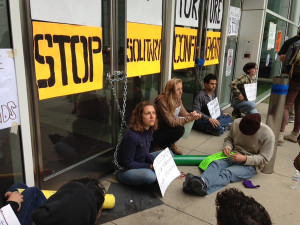Prison Hunger Strikers Face Retaliation, Say Supporters
Aug 8, 2013
Posted in Equal Rights/Equity, Police-Public Safety
By Jaron K. Epstein
Authorities are taking reprisals against participants in the ongoing hunger strike of prisoners against the indefinite detention of inmates in solitary confinement in the California prison system, according to supporters of the hunger strikers.
Mediators working to settle the strike are calling for an independent investigation into the July 22 death of Billy “Guero” Sell, a prisoner held in solitary confinement at Corcoran State Prison and a participant in the three-week hunger strike.
Sell’s death was ruled a suicide by prison officials who released a statement saying that he was not participating in the hunger strike at the time of his death.
Hunger strikers insist that he had repeatedly asked for medical attention for several days, but his requests were ignored. He was being held in solitary and was found dead in his cell, according to prison officials.

“The California Department of Corrections and Rehabilitation (CDCR) could have negotiated the demands of the prisoners well before the strike began. Had they done so, I am convinced that Billy Sell would still be with us today,” said St. Mary’s College Professor Ronald Ahnen of the mediation team.
“The conditions that they’re being held in is torture,” said Ahnen. “They’re human beings. That doesn’t give us the right, no matter what they did, it doesn’t give us the right to torture them.”
California has four Security Housing Unit prisons, holding more than 4,500 men. Separated from the rest of the prison population to control gang violence, they generally get less food, fewer privileges and no phone calls until they can earn their way back to a regular cell. Many are kept in solitary for decades.
The number of inmates participating in the hunger strike at first grew to over 30,000 inmates, but the number has since declined in the wake of retaliation by prison guards, spokespeople for the inmates have said.
“We urge CDCR to ensure that no prisoner on hunger strike be disciplined or threatened with the denial of medical care, that prisoners not be denied liquids, vitamins or any other form of sustenance they are willing to take, and that they receive appropriate medical care. We demand all medical professionals uphold their code of ethics and maintain the highest standards of care for all their patients – be they incarcerated or not,” according to a letter to prison officials by attorneys representing some of the hunger strikers.
Retaliation has allegedly been taken against 14 of those who have played central leadership roles in the current hunger strike, last year signing the Agreement to End Hostilities Among Racial Groups, which called for an end to the tactics used by the CDCR to create tensions and animosity amongst different racial groups hoping to incite conflicts and then vilify the inmates.
The 14 who signed this document were within the first few days of the hunger strike singled out and moved from isolated Security housing Unit cells to more extreme Segregated Administrative cells – without access to their legal documents, radio or television.
“The California Department of Corrections and Rehabilitation have been spending a lot of money sending around their spokesperson to demonize the inmates involved in the hunger strike and personally attack their family members,” said Isaac Ontiveros of the Prisoner Hunger Strike Solidarity Committee.